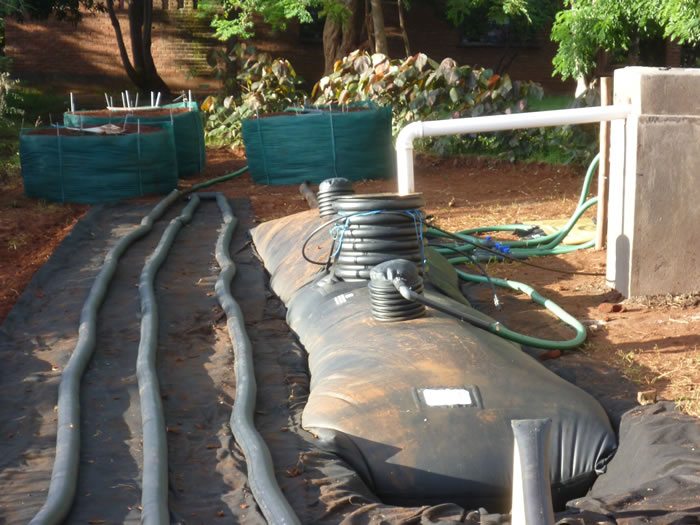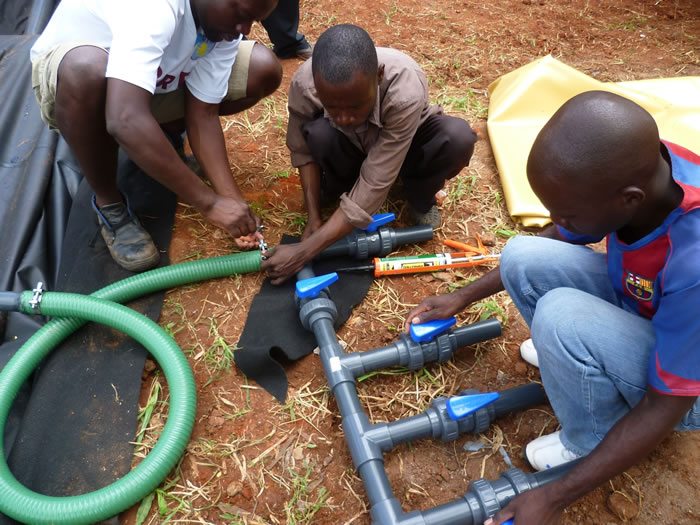Plastic piping systems donated by Polypipe have been installed in an exciting waste treatment and energy conversion project at Namisu Children’s Village in Malawi.
Home to up to 115 orphaned children and staff, and with its own school attended by more than 300 other children from the local area, Namisu Children’s Village is run by UK charity Aquaid Lifeline which was founded in 1999 to provide care and education for orphaned and needy children in Malawi. In order to solve the home’s twin challenges of replacing unsustainable wood as a fuel source and safely disposing of human waste, the charity in collaboration with Sustainable OneWorld Technologies CIC (SOWTech) installed the innovative Flexigester Integrated Faecal Treatment system.
In the purpose-built latrine block, waste is carried away from the toilets through Effast PVCu pipes from Polypipe before entering the Flexigester. Capable of performing anaerobic digestion to convert waste into biogas which it then stores until use, the system can also be used for pasteurisation of liquid by-products deactivating many of the potentially harmful pathogens that may be found in the waste.

The new system allows the village’s children and staff to use pour-flush toilets rather than pit latrines, improving hygiene and health, while also providing biogas which can be used as cooking fuel to supplement the current fuel, wood. The liquid by-product of the system can also be heated to kill pathogens and then used as sustainable, chemical-free fertiliser.
Polypipe’s Effast range of market-leading thermoplastic pipework was selected for its durability and ease of installation, and was donated to the project. Easy to join, the Effast range also contributed to the rapid installation of the system which was erected and ready to use in only three days – a fraction of the time it takes to build traditional anaerobic digestion facilities. The next stage of the project is to use Polypipe’s Effast range to provide latrine kits that are lightweight in nature so that they can be sent by airfreight to countries such as Malawi, but are strong enough to form the main ‘space frame’ structure of the latrine as well as carrying waste.
Used worldwide for plumbing systems as well as for the supply of potable water, Effast also features an incredibly smooth bore providing good flow characteristics, as well as abrasion resistance.
Les James of Polypipe commented: “It has been very rewarding to contribute to an innovative project which delivers the dual benefits of improving health and hygiene for up to 200 users a day, while producing a sustainable fuel source. The potential for systems such as the Flexigester is huge, as aid organisations seek to improve sanitation in Africa and beyond, and the Effast pipes and fittings we have donated are working very well as part of the wider system.
“We have a wealth of experience in providing pipework solutions for large-scale mining and construction projects throughout the continent, so it was gratifying to work on a community initiative which will have a positive impact on the children and staff of Namisu Children’s Village for many decades to come.”
The project was financed by the International Federation of Red Cross and Red Crescent (IFRC) as part of their ‘Faecal Sludge Treatment and Disposal in Emergency Situations Programme’.
Polypipe is one of Europe’s largest and most innovative plastic piping systems manufacturers, and the largest in the United Kingdom, with over 20,000 product lines and 50 years of experience exporting around the globe.
With a presence in around 100 countries – especially Europe and the Gulf – Polypipe is a major international supplier, with a proven track-record of delivering an impressive portfolio of high profile, integrated projects – including supplying plastic piping systems to Heathrow and Baku airports, Sports City in Dubai, Manchester United’s football stadium and to Olympic venues at the London 2012 Games.

